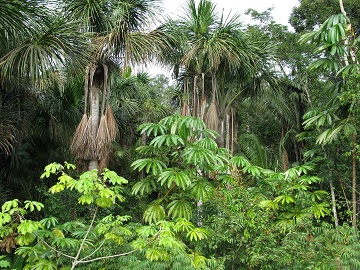International exchange fosters better local action on deforestation

Related topics
Agriculture & Forestry Environment & climate action International cooperation Sustainable agriculture and forestry Belgium Germany Netherlands United Kingdom Climate action Environment Cameroon Colombia Indonesia Kenya Nigeria Peru Vietnamdate: 10/02/2014
Project: Reducing emissions from deforestation an...
acronym: REDD-ALERT
See also: Info-Centre
Contact: http://redd-alert.hutton.ac.uk/
The REDD-ALERT project involved several European and international agricultural research institutes. Focusing on four representative countries (Cameroon, Indonesia, Peru and Vietnam), the project team “looked at ways in which funds arriving at the national level could be used to reduce deforestation,” explains Dr Robin Matthews, project coordinator.
International funding is available to a country in return of reducing its deforestation rate. “So take, for example, Cameroon,” says Dr Matthews. “If it can demonstrate that it had reduced its rate of deforestation below an agreed baseline, it would then be eligible to receive carbon credits to compensate for that,” he adds.
The modelling work carried out by the project team has shown the success of the implementation of Reduced Emissions from Deforestation and Degradation (REDD+) mechanisms is dependent on local context and that it is difficult to generalise. “The devil is in the detail, and solutions need to be tailored to each individual situation,” he says.
One activity of the project focused on the changes in GHG emissions of forest areas in Indonesia as they make way for palm oil and acacias plantations. “From our work, we now have a much better grasp of the implications of these changes. The results will contribute to the new Intergovernmental Panel on Climate Change (IPCC) guidelines for calculating greenhouse gas emissions from these land-use changes,” explains Dr Matthews.
One of the international partners, the World Agroforestry Centre (ICRAF), which is headquartered in Nairobi, Kenya, had a key role to play in the project. The partner analysed the changes in land-use in relation to above ground carbon stocks. “Our work, together with the other project partners, helped quantify the emissions for the specific pattern of tree cover change on the three continents, taking into account their contrasting drivers of change,” says Meine van Noordwijk, Chief Science Advisor at ICRAF.
“We also advised on how national systems for monitoring, reporting and verification can be set up, making use of pre-existing data from various sources. Overall, the work showed that conflict resolution rather than payments must be the first step towards making a difference in tropical forest margins, when seen from a bottom-up perspective,” says van Noordwijk.
Another key outcome of the project was the publication of a book, Climate Change, Forests and REDD, which was produced by the University of Amsterdam with contributions from all the project partners. The book assessed drivers and policy instruments for promoting REDD+ and making it effective in different countries.
At the UNFCCC CoP18 meeting in Doha, in 2012, the project team held a side event in the European Union (EU) pavilion to address the relevance of REDD and, indeed, raise the question of its future, which the book also tackled. According to Dr Matthews “The support from the EU to the REDD-ALERT project meant that we were able to draw together a team of world-class researchers on tropical deforestation to address the REDD+ initiative on the global imperative of reducing emissions from land-use change in the tropics.”
